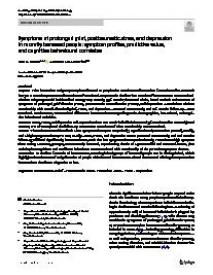Symptoms of prolonged grief, posttraumatic stress, and depression in recently bereaved people : symptom profiles, predictive value, and cognitive behavioural correlates
Purpose: Prior latent class analyses (LCA) have focused on people who were bereaved more than 6 months earlier. Research has yet to examine patterns and correlates of emotional responses in the frst few months of bereavement. We examined whether subgroups could be identifed among very recently (≤6 months) bereaved adults, based on their endorsement of symptoms of prolonged grief disorder (PGD), posttraumatic stress disorder (PTSD), and depression. Associations of class membership with overall disturbed grief, PTSD, and depression—assessed concurrently and at 6 months follow-up—were examined. Furthermore, we examined diferences between classes regarding socio-demographics, loss-related, and cognitive behavioural variables.
Methods: PGD, PTSD, and depression self-report data from 322 Dutch individuals bereaved≤6 months earlier were subjected to LCA; N=159 completed the follow-up assessment. Correlates of class membership were examined.
Results: Three classes were identifed: a low symptom class (N=114; 35.4%), a predominantly PGD class (N=96; 29.8%), and a high symptom class (N=112; 34.8%). PGD, PTSD, and depression scores (assessed concurrently and at 6 months follow-up) difered signifcantly between classes, such that low symptom class<predominantly PGD class<high symptom class. Being a woman, younger, more recently bereaved, experiencing deaths of a partner/child and unnatural losses, plus maladaptive cognitions and avoidance behaviours were associated with membership of the pervasive symptom classes.
Conclusion: In the frst 6 months of bereavement, meaningful subgroups of bereaved people can be distinguished, which highlights the relevance of early detection of people with elevated bereavement-related distress and ofering them preventive interventions that foster adaptation to loss.
Geachte bezoeker,
De informatie die u nu opvraagt, kan door psychotraumanet niet aan u worden getoond. Dit kan verschillende redenen hebben,
waarvan (bescherming van het) auteursrecht de meeste voorkomende is. Wanneer het mogelijk is om u door te verwijzen naar de bron
van deze informatie, dan ziet u hier onder een link naar die plek.
Als er geen link staat, kunt u contact opnemen met de bibliotheek,
die u verder op weg kan helpen.
Met vriendelijke groet,
Het psychotraumanet-team.
In: Social Psychiatry and Psychiatric Epidemiology ISSN: 1966 - 2019 | 55 | 765-777
https://link.springer.com/content/pdf/10.1007/s00127-019-01776-w.pdf


